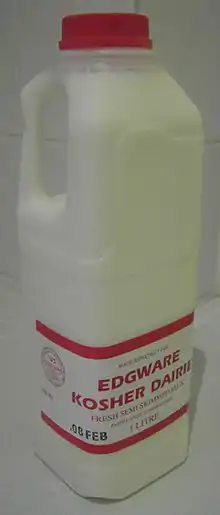Chalav Yisrael
Chalav Yisrael[1] (Hebrew: חלב ישראל), common Ashkenazi pronunciation Cholov Yisroel, is a Halachic term which refers to all dairy products, including cheese and non-fat dry milk powder, which derive from milk that has been milked under the supervision of a religiously observant Jew.

 A bottle of Chalav Yisrael milk | |
| Halakhic texts relating to this article | |
|---|---|
| Babylonian Talmud: | Avodah Zarah 35b, 39b |
| Shulchan Aruch: | Yoreh De'ah 115:1 |
In Judaic law
According to Jewish law (halacha), milk is only considered kosher if it derives from a kosher species of animal (such as cows and sheep), while milk from a non-kosher species (such as horses and camels) is non-kosher.
Rabbinic authorities in Mishnaic times had already issued an injunction against the drinking of any milk whose milking was not done by, or under the supervision of a Torah-observant Israelite.[2]
Milk that has been unsupervised while being extracted is referred to in halachic literature as either chalav akum or chalav nochri. This prohibition was codified in the Shulchan Aruch[3] which forbids consumption of any milk not milked under Jewish supervision. This prohibition forbids consumption but not any other form of use or benefit.[4]
In the USA and other countries with similar regulations
The first chalav Yisrael dairy farm on the East Coast of the United States, and possibly in the entire United States, was started by Isaac Balsam in 1903, and remained in business until 1955.[5]
All dairy products made in the USA and countries with government regulations on milk, even when bearing a kosher symbol, are likely to be "chalav stam". Chalav stam is a classification literally translating to "plain milk," which is given to milk produced in a country where government regulations make it reasonable to assume that milk is 100% what it is labeled as (i.e. anything labeled as "milk" is 100% cows milk, goat's milk must be 100% goats milk and labeled as such, etc.). Because the supervising bodies in the United States and countries where chalav stam is acceptable impose penalties and fines on milk producers found to be in violation of this requirement, Rabbi Moshe Feinstein ruled that one can logically infer that milk produced there has not been mixed with non-kosher milk and therefore does not receive the designation of "chalav akum." Kosher certifications in such countries usually mark "chalav yisrael" in either English or Hebrew next to their kosher symbol. In Israel, kosher certifiers don’t usually mark “chalav yisrael” since it is the standard there—in fact, kosher dairy products in Israel that are not chalav Yisrael are typically marked as such.
According to Kabbalah, it is preferable to be strict concerning chalav Yisrael due to spiritual ramifications relating to the concept that drinking non-chalav Yisrael leads to "timtum ha-lev", a spiritual deadening of the heart.
References
- This is the colloquial pronunciation of the phrase. The correct Hebrew pronunciation is "Chalev Yisrael."
- "כאן קודם חזרה כאן לאחר חזרה ומשנה לא זזה ממקומה". Sefaria.org. Retrieved 2018-04-27.
- sec. Yoreh Deah 115:1
- Talmud 'Avodah Zarah 35b, see also Goldberg, C Binyamin. Bein Yisrael L'nochri. p. 124.
- For some background on Isaac Balsam and the Balsam dairy farm, see Hamodia Magazine, March 4, 2009, p.3; see also Shain, Ruchoma (2001) [1984]. All for the Boss. Feldheim Publishers. pp. 149–150. ISBN 1-58330-470-3.
External links
- OUKosher.org: Cholov Yisroel
- Kashrus Kurrents, Chalav Yisroel: Does a Neshama Good by Rabbi Moshe Heinemann, Star-K Rabbinic Administrator